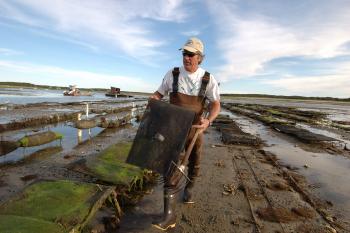Bob Wallace

Cape Cod Shellfish Industry Interviews
This is a collection of 15 interviews conducted in 2007 with people on Cape Cod who are involved in the shellfishing industry. Five people who are employed by towns to manage and regulate shellfish (Shellfish Officers), seven people who own shellfish aquaculture businesses (Growers), and four people who harvest wild shellfish commercially (Commercial Harvesters) were asked the question “What does shellfishing mean to you?”. From that starting point, questions centered on how the individual got into shellfishing and then what they thought the future of shellfishing might be.
The interviews were conducted by Sandy Macfarlane, a retired shellfish biologist and conservation administrator for the town of Orleans. The work was done under a contract with the Barnstable County Cooperative Extension Marine Program. Each interview is summarized into a written document that varies from 807 to 1557 words long and has an accompanying photograph. The interviews represent geographic, age, gender, and experience diversity as well as shellfish species diversity. All interviewees are year round residents of Cape Cod. One theme that emerged from this work is that shellfishing remains an important component of the Cape Cod economy and culture and those who are involved are concerned about its continued presence.
In 2007, Bob Wallace was a shellfish grower in the town of Wellfleet. He has been an integral figure in the local shellfishing industry. His life's work has centered on the cultivation and harvesting of shellfish, a trade that has sustained his family for generations. Wallace's expertise in shellfishing is not only a testament to his personal dedication but also serves as a living connection to the region's maritime heritage. Over the years, he has witnessed the ebb and flow of the industry, adapting to the changing tides of environmental, economic, and regulatory landscapes. His involvement in shellfishing extends beyond the day-to-day operations, as he has played a significant role in community initiatives aimed at preserving the vitality of the industry for future generations. Wallace's story is one of resilience and commitment to a way of life that defines the character of Cape Cod.
Scope and Content Note
The interview with Bob Wallace provides an in-depth look into the shellfishing industry on Cape Cod, as seen through the eyes of someone deeply embedded in its practice. Wallace shares his personal narrative, detailing his journey within the industry, including the methods of shellfishing, the evolution of practices over time, and the knowledge passed down through his family. He speaks to the significance of shellfishing in the local economy, emphasizing its role in job creation and its contribution to the community's economic stability. The interview also touches on the cultural importance of shellfishing, reflecting its place in the social fabric of Cape Cod. Challenges faced by the industry, such as environmental concerns, regulatory changes, and market fluctuations, are discussed alongside Wallace's insights into how the community has navigated these issues. Successes are celebrated, particularly the ways in which the industry has managed to adapt and thrive. This interview serves as a valuable resource for understanding the multifaceted impact of shellfishing on Cape Cod from an economic, cultural, and personal perspective.
Please Note: The oral histories in this collection are protected by copyright and have been created for educational, research and personal use as described by the Fair Use Doctrine in the U.S. Copyright law. Please reach out Voices@noaa.gov to let us know how these interviews are being used in your research, project, exhibit, etc. The Voices staff can help provide other useful resources related to your inquiry.
The NOAA mission is to understand and predict changes in climate, weather, oceans, and coasts, to share that knowledge and information with others, and to conserve and manage coastal and marine ecosystems and resources. The Voices Oral History Archives offers public access to a wide range of accounts, including historical materials that are products of their particular times, and may contain offensive language or negative stereotypes.
Voices Oral History Archives does not verify the accuracy of materials submitted to us. The opinions expressed in the interviews are those of the interviewee only. The interviews here have been made available to the public only after the interviewer has confirmed that they have obtained consent.
